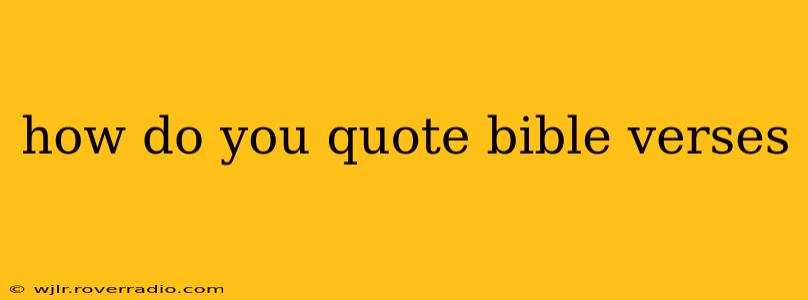How Do You Quote Bible Verses? A Guide to Accurate and Effective Citation
Quoting Bible verses accurately and effectively is crucial for theological discussions, sermons, academic papers, and casual conversations. This guide will walk you through the different methods, explaining their nuances and helping you choose the best approach for your context.
Different Methods for Quoting Bible Verses
Several methods exist for quoting scripture, each with its own advantages and disadvantages:
1. Using Book, Chapter, and Verse Numbers (Most Common)
This is the most widely accepted and easily understood method. You simply state the book, chapter, and verse numbers, often abbreviated.
-
Example: "Love your enemies" (Matthew 5:44). Or, for multiple verses, "Love your enemies, bless those who curse you, do good to those who hate you, and pray for those who mistreat you and persecute you" (Matthew 5:44-45).
-
Abbreviations: Using standard abbreviations for books of the Bible is widely accepted and saves space. For instance, Mt for Matthew, Jn for John, Rom for Romans, etc. A full list of common abbreviations is readily available online.
-
Consistency: Maintain consistency in your formatting throughout your writing. Choose one style (e.g., using periods after abbreviations or not) and stick to it.
2. Using a Specific Bible Version
Different Bible translations have varied wording. Specifying the version clarifies your source and avoids ambiguity, particularly when discussing nuanced theological points.
-
Example: "Love one another as I have loved you" (John 13:34, NIV). Here, NIV indicates the New International Version. Other popular versions include ESV (English Standard Version), KJV (King James Version), NLT (New Living Translation), and many more.
-
Importance of Version: The choice of version often depends on your audience and the context. For academic papers, specifying the version is vital. For casual conversation, it may be less critical.
3. In-Text Citations (For Academic Papers)
In formal academic writing, you'll likely need in-text citations following a specific style guide (MLA, APA, Chicago, etc.). This often involves parenthetical references at the end of the quote.
- Example: The scripture states, "Let your light shine before others, that they may see your good deeds and glorify your Father in heaven" (Matthew 5:16, NIV). This method might vary slightly depending on the style guide.
4. Block Quotes for Longer Passages
For longer quotations (generally four lines or more), use a block quote, indenting the text and typically omitting quotation marks.
- Example:
Blessed are the poor in spirit, for theirs is the kingdom of heaven. Blessed are those who mourn, for they will be comforted. Blessed are the meek, for they will inherit the earth. Blessed are those who hunger and thirst for righteousness, for they will be filled. (Matthew 5:3-6, ESV)
How to Avoid Common Mistakes
- Accuracy: Double-check your verse numbers to ensure accuracy. A simple mistake can significantly alter the meaning.
- Context: Always consider the context of the passage. Taking verses out of context can lead to misinterpretations.
- Proper Punctuation: Use proper punctuation, including quotation marks and parentheses where needed.
- Attribution: If you're paraphrasing, clearly indicate that you're doing so.
By following these guidelines, you can quote Bible verses accurately, effectively, and appropriately for your specific purpose. Remember that clear and precise citation demonstrates respect for the source material and enhances the credibility of your work.
